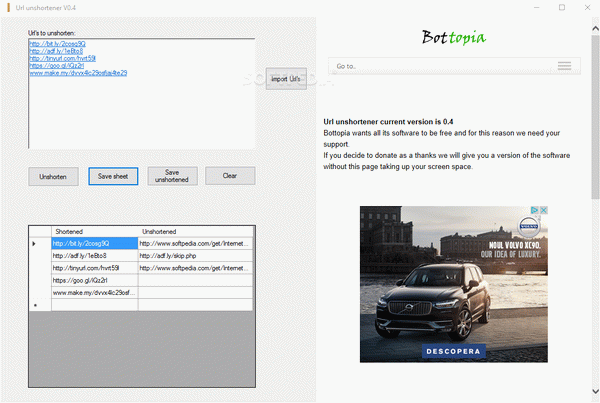Url unshortener is am application that whose goal is to undo what URL shorteners do: reveal the original URLs masked under shortned links.
It supports AdFly (adf.ly), TinyURL (tinyurl.com), Goo.gl (goo.gl), Bitly (bitly.com) and Make.my (make.my).
This type of software is extremely useful when you receive unknown URLs that were shortened using one of the previously mentioned services.
By unhiding the masked website links, it possible to tell if it's infected with malware or if you're about to access NSFW content in an unsafe environment.
Installing this program isn't necessary because it's wrapped in a single .exe file. You can run it from any part of your computer as well as store it on a thumb drive to deploy it on any PC to reveal shortened URLs.
Nevertheless, Url unshortener isn't really portable because it depends on .NET Framework to work properly.
The interface is anything by attractive. It's made from a rudimentary-looking window that shows all options in a neatly displayed layout.
Multiple URLs can be unshortened at the same time by either typing or pasting them in the main window (one link per line) or by importing them from a plain text document.
Once the task is over, you should be able to view the original website name of each shortened URL in the main panel. This can be saved as a CSV file while the list with shortened links can be saved as a TXT file.
Unfortunately, Url unshortener didn't meet some of our expectations in our tests. It took its time to unshorten the URLs, became buggy during the job, and failed to reveal websites shortened with Goo.gl and Make.my.
In several cases, it just stopped responding to commands, forcing us to terminate its process from Task Manager.
All things considered, Url unshortener could become a practical tool for unveiling shortened URLs received from unknown sources but it's not there yet. Additional work is needed on behalf of the developers.

Martin
спасибо за кряк для Url unshortener
Reply
bernardo
感謝Url unshortener補丁
Reply
Luciano
salamat sa inyo para sa patch
Reply